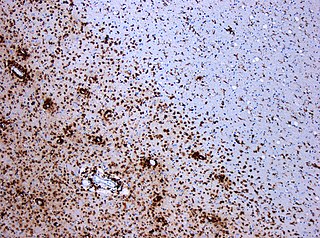Brain death is the complete loss of brain function. It differs from persistent vegetative state, in which the person is alive and some autonomic functions remain. It is also distinct from an ordinary coma, whether induced medically or caused by injury and/or illness, even if it is very deep, as long as some brain and bodily activity and function remains; and it is also not the same as the condition known as locked-in syndrome. A differential diagnosis can medically distinguish these differing conditions.
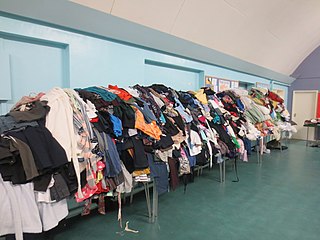
A jumble sale, bring and buy sale or rummage sale is an event at which second hand goods are sold, usually by an institution such as a local Boys' Brigade Company, Scout group, or church, as a fundraising or charitable effort. A rummage sale by a church is called a church sale or white elephant sale, frequently as part of a church bazaar.

Body donation, anatomical donation, or body bequest is the donation of a whole body after death for research and education. Donated bodies are mostly used for medical education and research. They are used for gross anatomy, surgical anatomy and for furthering medical education. For years, only medical schools accepted bodies for donation, but now private programs also accept donors. Depending on the program's need for body donation, some programs accept donors with different specifications.
Spastic diplegia, historically known as Little's disease, is a form of cerebral palsy (CP) that is a chronic neuromuscular condition of hypertonia and spasticity—manifested as an especially high and constant "tightness" or "stiffness"—in the muscles of the lower extremities of the human body, usually those of the legs, hips and pelvis. Doctor William John Little's first recorded encounter with cerebral palsy is reported to have been among children who displayed signs of spastic diplegia.

The Paralympic sports comprise all the sports contested in the Summer and Winter Paralympic Games. As of 2016, the Summer Paralympics included 22 sports and 526 medal events, and the Winter Paralympics include 5 sports and disciplines and about 72 events. The number and kinds of events may change from one Paralympic Games to another.
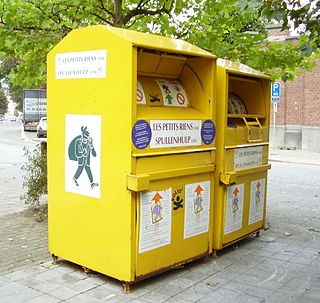
Textile recycling is the method or process of reusing or reprocessing used clothing, fibrous material, and clothing scraps from the manufacturing process. Textiles in municipal solid waste are found mainly in discarded clothing, although other sources include furniture, carpets, tires, footwear, and non-durable goods such as sheets and towels
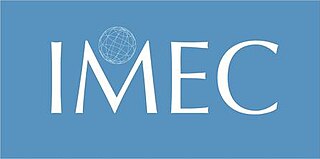
International Medical Equipment Collaborative (IMEC) is a 501(c)(3) non profit organization that provides medical equipment to doctors and nurses working hospitals and clinics in impoverished areas worldwide. IMEC is in North Andover, Massachusetts, United States, where volunteers sort, repair, package and ship donated medical supplies and equipment to international medical personnel. Through partnerships with various humanitarian organizations IMEC has been delivering medical supplies for 14 years. IMEC is known for providing medical supplies that doctors request for their patients.
A standing wheelchair is assistive technology, similar to a standing frame, that allows a wheelchair user to raise the chair from a seated to a standing position. The standing wheelchair supports the person in a standing position and enables interaction with people and objects at eye level.
HIT Humanitarian is a 501(c)3 charitable organization established in 2009 by Heritage Internet Technologies (HIT), a Utah-based IT/web-hosting company. It was formed in response to donations being made by the company and its employees to support humanitarian efforts around the globe. The organization's primary purpose is to provide funding and resources to communities and organizations in effort to reduce malnutrition and disease, develop clean-water and clean-energy sources, build educational and health-care infrastructure, and encourage self-sustaining practices. HIT Humanitarian also provides deeply discounted web design services for non-profit, charitable, and other organizations that offer beneficial services to their communities.

Over time, the approach to cerebral palsy management has shifted away from narrow attempts to fix individual physical problems – such as spasticity in a particular limb – to making such treatments part of a larger goal of maximizing the person's independence and community engagement. Much of childhood therapy is aimed at improving gait and walking. Approximately 60% of people with CP are able to walk independently or with aids at adulthood. However, the evidence base for the effectiveness of intervention programs reflecting the philosophy of independence has not yet caught up: effective interventions for body structures and functions have a strong evidence base, but evidence is lacking for effective interventions targeted toward participation, environment, or personal factors. There is also no good evidence to show that an intervention that is effective at the body-specific level will result in an improvement at the activity level, or vice versa. Although such cross-over benefit might happen, not enough high-quality studies have been done to demonstrate it.

Spastic cerebral palsy is the type of cerebral palsy wherein spasticity is the exclusive impairment present. Itself an umbrella term encompassing spastic hemiplegia, spastic diplegia, spastic quadriplegia and — where solely one limb or one specific area of the body is affected— spastic monoplegia. Spastic cerebral palsy affects the cerebral cortex and is overwhelmingly the most common type of overall cerebral palsy.
Para-alpine skiing classification is the classification system for para-alpine skiing designed to ensure fair competition between alpine skiers with different types of disabilities. The classifications are grouped into three general disability types: standing, blind and sitting. Classification governance is handled by International Paralympic Committee Alpine Skiing. Prior to that, several sport governing bodies dealt with classification including the International Sports Organization for the Disabled (ISOD), International Stoke Mandeville Games Federation (ISMWSF), International Blind Sports Federation (IBSA) and Cerebral Palsy International Sports and Recreation Association (CP-ISRA). Some classification systems are governed by bodies other than International Paralympic Committee Alpine Skiing, such as the Special Olympics. The sport is open to all competitors with a visual or physical disability. It is not open to people with intellectual disabilities.
Boccia classification is the classification system governing boccia, a sport designed specifically for people with disabilities. Classification is handled by Cerebral Palsy International Sports and Recreation Association. There are four classifications for this sport. All four classes are eligible to compete at the Paralympic Games.

Spastic Society of Gurgaon covers within its scope the programs on occupational therapy, counseling, vocational training and psychotherapy of the children with autism, cerebral palsy, intellectual disability and multiple disabilities in Haryana, India. It is India's first non-profit disability sector organization which was awarded ISO certification by United Kingdom Accreditation Service : United Registrar of Systems for quality of services rendered by it. It also works in the field of imparting counseling and psychotherapy to the parents and guardians of the disabled children. Mass camps are conducted for welfare of children with disabilities. Multiple single window services like assistance in issuance of disability certificates, NIRAMAYA cashless insurance cards, medical check ups, distribution of medicines and medical aids are rendered to the disabled in such camps. Being sponsored by Haryana Government it undertakes disability audits of organizations for assessing accessibility compliance by them.
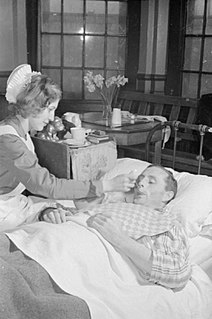
Assisted feeding, also called hand feeding or oral feeding, is the action of a person feeding another person who cannot otherwise feed themselves. The term is used in the context of some medical issue or in response to a disability, such as when a person living with dementia is no longer able to manage eating alone. The person being fed must be able to eat by mouth, but lacks either the cognitive or physical ability to self-feed. Individuals who are born with a disability like cerebral palsy, or arthrogryposis multiplex congenita (AMC) may be unable to feed themselves. Also, those who acquire a disability due to an accident or a disease like amyotrophic lateral sclerosis (ALS) may require hand feeding because they may become unable to pick-up and bring food to their own mouth. Guidance about safely assisting people to eat can be found at the Feeding the Disabled website.
The Community Amateur Sports Club (CASC) scheme was introduced in 2002 by the then Labour government to support grass roots sport. The original legislation was drafted by Andrew Phillips. It recognises the importance of sport in the community by allowing local amateur sports clubs to register with HM Revenue and Customs (HMRC) as a sports club rather than a business for rates and tax purposes. As such, clubs can benefit from a range of tax reliefs, including Gift Aid and rate relief. Both property and non-property owning clubs can significantly benefit from the scheme.

Ottawa Tool Library (OTL) is a not for profit tool lending public library system based in Ottawa, Ontario, Canada. Tool libraries loan specialized tools for both experienced and inexperienced community members who are interested in home repair, maintenance, building projects, community projects, gardening and landscaping as well as cooking. The OTL offers standard, group, individual and gift memberships.

The 3000 Club is a Phoenix-based charity which works with food banks in Arizona in order to reduce food waste. The 3000 Club's main program is known as Market on the Move, although the organization provides other services for Arizona communities. Their mission statement is "Providing life saving fresh fruits and vegetables to impoverished families."
